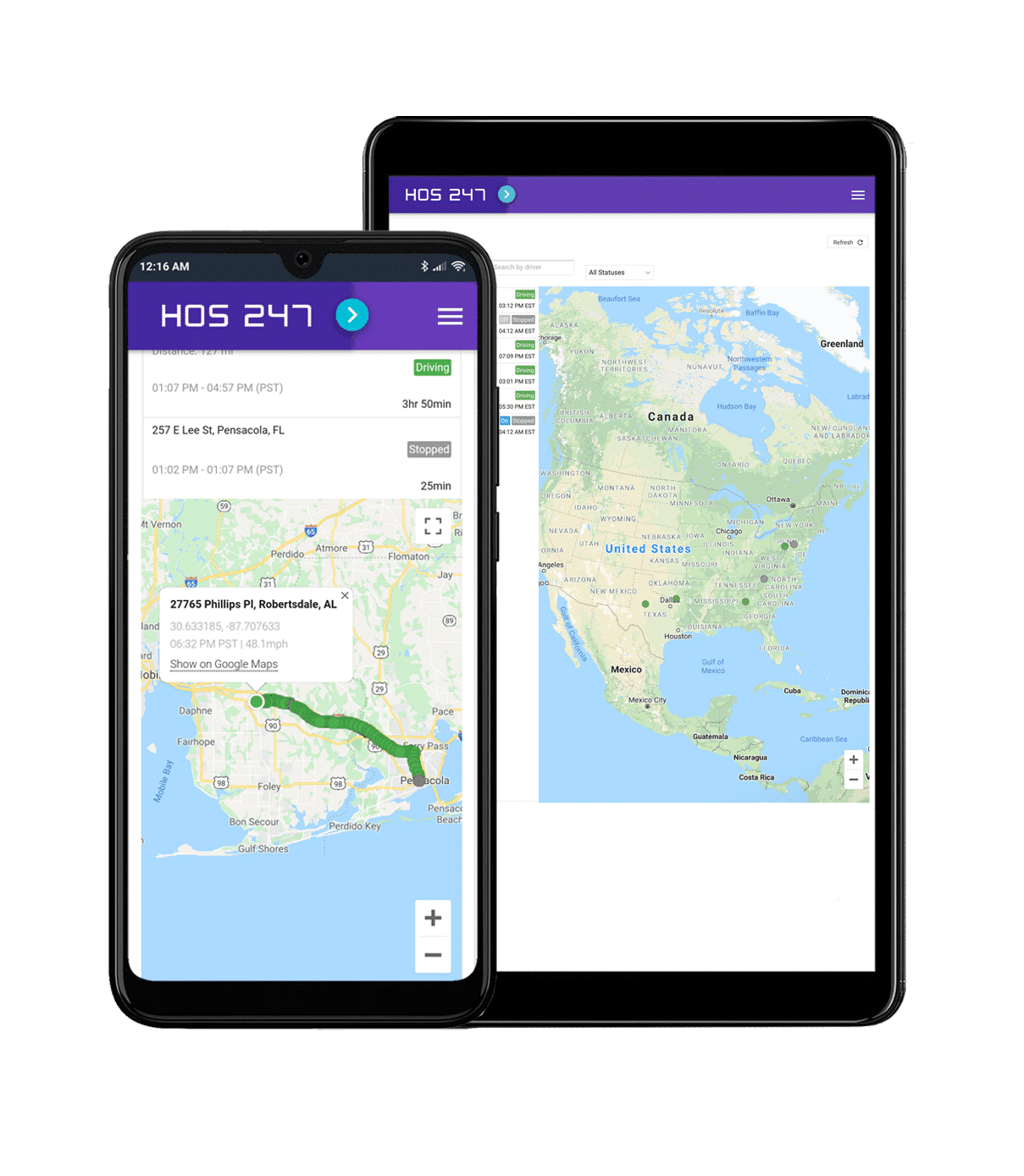As the popularity of fleet management platforms increases, more carriers in the US are looking for low cost GPS fleet tracking options to increase the profitability of their business. However, by prioritizing the price truckers may risk compromising the quality of a solution. If a system breaks down during operations, it may compromise the security of the fleet, driver’s safety, and the quality of dispatch and customer service, decreasing profitability.
By purchasing cheap fleet tracking solutions, motor carriers may end up spending a lot more than they intended. To prevent this from happening, fleet owners should know what features to pay attention to when choosing a solution. In this article, we will discuss the crucial characteristics of a quality fleet management platform to help carriers find a reliable system at a reasonable price.
Do you have any questions? Talk to ELD Advisor: 650-405-3372 or Request Callback
How to Choose a Quality Fleet Tracking System
There are several prospects to consider when choosing a fleet management platform. Depending on every business’ specifics, motor carriers may prioritize different features. For instance, if your vehicles travel interstate, a reliable electronic logging device integrated with the system could be the first thing to take into account.
If your main goal is to have maximum visibility of your fleet, you should look for a solution with real-time tracking instead of periodic updates. Many providers offer systems that include a variety of features to help carriers improve compliance, ensure fleet security and optimize operational workflows.
Regardless of the specific goals you want to accomplish, there are common characteristics that distinguish an effective tracking solution. In the quest for reliable GPS fleet tracking, motor carriers should pay extra attention to the following qualities:
- Straightforward installation. Complex systems that need special installation are most likely to lead to downtime as the carrier’s staff may struggle to set them up correctly or might need an expert to install them. In some cases, special installation may require a fee—which might come with an extra fee. Look for a system that the members of your crew can easily set up without specialized help.
- Compatible hardware. If you manage a fleet with light-, medium- and heavy-duty trucks, don’t forget to ask a potential provider about the system compatibility. It’s important to find a provider that offers devices compatible with all different vehicle classes, otherwise, you might end up needing more than one provider and working with different systems.

- Ease of use. Since tracking technology is complex, intuitive software is of great importance. Ensure that your provider has a user-friendly fleet manager portal to facilitate supervisors’ jobs.
- Efficient technical support. If the solution is not backed up by efficient and accessible customer support service, it will be more challenging to implement. A reliable technical support team should help their customers get the most out of their tracking system by assisting clients with troubleshooting, training, and clarifying all doubts concerning its use.
- Demo or trial period. Especially when it comes to low cost GPS fleet tracking, it’s important to test the system before making a purchase. Ask a provider for a demo to see if the solution suits your business needs.
- 4G technology. Choose a provider that supports a 4G network for reliable data transmission. Poor signal quality may provoke interruptions in real-time tracking, affecting fleet visibility. Tracking devices that use 4G can offer excellent service providing accurate updates on the vehicle location and diagnostics. When considering a low cost GPS fleet tracking solution, inquire about the network the provider uses to make sure it’s not outdated.
HOS247 Truck Tracking Devices
An expert in the field of ELD and fleet management, HOS247 uses 4G LTE that offers ten times faster connectivity than 3G. The hardware gathers the GPS coordinates between 30 seconds and 2 minutes, allowing fleet managers to monitor the vehicle’s location in real time. HOS247 trackers collect GPS vehicle data separately from the driver data, making these metrics accessible at any time. HOS247 offers both ELD-integrated & hardwired fleet GPS tracking devices. Let’s look into the difference between them and explore their main characteristics and specific functions.
ELD-Integrated Tracker
A plug-and-play type, this tracker can be installed in minutes by being plugged into the vehicle’s OBD2 port. Integrated with an FMCSA-approved electronic logging device, it helps motor carriers reduce the risk of HOS violations, avoid expensive fines and improve their CSA score. Simple and efficient, this tracker is a perfect choice for motor carriers that engage in interstate commerce. The ability to uninstall the device as easily allows truckers to rotate it between vehicles in the fleet, saving money on buying a device for each truck.
24/7 Monitoring Tracker
Enhanced with a separate battery, this hardwired fleet tracking device continuously collects and transfers GPS data, granting motor carriers full visibility of their fleet. This tracker comes with a SIM card and provides a steady connection even in remote areas and during challenging weather conditions. Tamper-proof, HOS247 monitoring devices ensure fleet security and help recover assets in case of theft. The installation process doesn’t take longer than ten minutes; just like with the ELD-integrated tracker, the hardware can be set up without the help of a specialist.
A reliable GPS tracker can dramatically improve trucking operations, customer service, and communication between drivers and office staff. Fleet visibility provided by real-time tracking allows dispatchers to plan routes more efficiently, clients to track their assets, and fleet managers to assign loads to the operator who is closer to the location.

Features of the HOS247 GPS Tracking System
What makes a fleet tracking system effective is a set of digital solutions that automate processes and gather vehicle metrics that help carriers solve potential and actual issues to improve fleet vehicle performance and productivity. In this section, we discuss the tools offered by HOS247 trackers and how they work.
- Vehicle maintenance. One of the perks of collecting and analyzing vehicle data is that the system uses this information to schedule preventive maintenance that prolongs the longevity of the truck. Based on mileage, hours of usage data, and past service history, this solution issues automatic reminders of maintenance events such as license renewals, tire rotations, oil changes and warranty expirations to minimize the risk of breakages. Fleet vehicle tracking platforms that include this maintenance feature make low cost GPS fleet tracking possible, because preventive maintenance may save thousands of dollars on repairs and downtime.
- Fault code detection. This solution detects vehicle malfunctions and generates a specific trouble code of issues that affect the truck’s normal functioning, notifying a driver about the fault with a warning light at the vehicle’s instrument panel and sending an alarm to the fleet manager’s portal. This tool allows timely decisions to be made before the problem becomes critical.
- Automated idle tracking. The idle reporting feature helps motor carriers save considerable sums of money on fuel wastage. It notifies fleet managers about excessive idling so supervisors can coach their operators to be more conscious about fuel consumption.
Carriers in search of low cost GPS fleet tracking should take into account the financial benefits that come from using a dependable system. Low monthly fees are attractive, but the greater benefits of tracking systems mainly rely on their ability to help your business increase efficiency and profitability.
Advantages of Using a Fleet Management System

Fleet management platforms are an effective tool to oversee and optimize fleet operations. Besides GPS, they may include ELD, automated IFTA state mileage calculations, fault code detection, idle reporting, and other digital solutions to help facilitate operations and boost overall productivity. The advantages they can bring to your business include:
- Reduced operational costs. Predictive analytics and accurate reporting are the two main tools that make a fleet management platform so effective in cutting operational expenses. Based on the collected data, the system analyzes fleet performance, granting an optimal solution to prevent expensive vehicle repairs, reduce fuel costs, lower insurance premiums, and avoid high-priced penalties, saving carriers thousands of dollars.
- Compliance. HOS violations lead to serious consequences that may compromise the motor carrier’s reputation. Fleet management technology integrated with an ELD facilitates the task of managing electronic logging, electronic driver vehicle inspection reports, and log auditing.
- Improved fleet and driver safety. Besides ensuring fleet security, the system also enhances drivers’ safety and protects operators from false claims. The solution notifies fleet managers if the vehicle gets into an accident or is driven to an unauthorized location. Preventive maintenance reduces the risk of unexpected breakage, improving vehicle security and road safety.
- Better communication and customer service. Fleet management platforms help streamline shipping routes and communication between different departments, improving customer service.
- Increased productivity. Collected vehicle data allows fleet managers to analyze operational workflows more efficiently, accurately identifying areas of opportunities and minimizing potential risks. For example, a tax reporting feature reduces human error and audit risk. It helps eliminate the administrative paperwork burden, making tax reporting more efficient.
HOS247 is a top-rated provider with years of experience. Now that we have gone through the perks of a reliable solution over low cost GPS fleet tracking, we invite you to check our prices and order your demo to enjoy the advantages of our affordable GPS fleet tracking system.

As an expert in B2B and B2C sales, I’ve dedicated myself to perfecting sales processes and client retention strategies in the logistics and trucking industry. I have significantly contributed to the expansion of the ELD service, catering to retail and wholesale clients in need of HOS247 ELD solutions. My unwavering commitment to implementing state-of-the-art sales techniques and technologies ensures the continuous growth and success of businesses I work with.










In the world of commercial trucking, efficient and compliant driving operations are paramount. CDL driver log books, also known as electronic logging devices (ELDs), have become indispensable tools for carriers and drivers to accurately track their hours of service (HOS)

Electronic logging devices were designed to replace the traditional paper logbooks and automatic on-board recording devices previously used by commercial drivers to keep track of their hours of service. Since the implementation of the ELD mandate, elogs have become an

As a commercial motor vehicle carrier or driver, you need a truck logbook that complies with the Federal Motor Carrier Safety Administration’s regulations. The fact that FMCSA certified electronic logging devices do not necessarily fulfill all the necessary requirements complicates
